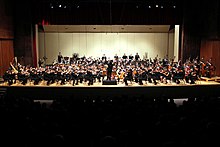Orquesta Sinfónica de la Juventud Venezolana Simón Bolívar



The Orquesta Sinfónica de la Juventud Venezolana Simón Bolívar is the state youth symphony orchestra of Venezuela . The orchestra, named after the South American freedom fighter Simón Bolívar , was founded in 1978 by the Venezuelan economist and musician José Antonio Abreu .
Scope and recruitment
The Simón Bolívar Youth Orchestra is the leading of 30 professional orchestras belonging to the Fundación del Estado para el Sistema de Orquesta Juvenil e Infantil de Venezuela (FESNOJIV). The state-funded program aims to provide children and young people from all social backgrounds with a sound musical education and has produced orchestras and musicians of exceptional quality. In 2008, 350,000 participants in 180 centers received, among other things, free loan musical instruments from the so-called “ sistema ” ; in 2017, according to official information, 827,000 young people were enrolled in the sistema . According to Geoffrey Baker, the top orchestras were used politically as image carriers of Chavismus .
Over the years, conductors such as Claudio Abbado , Sir Simon Rattle and Zubin Mehta have come to Venezuela regularly to make music with the youngsters. Rattle had similar smaller projects with problem students in Berlin, which were shown in the film Rhythm Is It! were documented.
The most famous exponent of the orchestra from 1999 onwards was Gustavo Dudamel , who became chief conductor of the orchestra at the age of 18. Under his direction, the orchestra has recorded several audio CDs , including two recordings of symphonies by Ludwig van Beethoven and Gustav Mahler for Deutsche Grammophon . In August 2007 the orchestra made its debut at the London Proms under his direction .
In 2009 José Antonio Abreu received the Frankfurt Music Prize and donated the prize money to the orchestra he founded. The orchestra was often a guest at the Beethovenfest in Bonn , and in 2010 Abreu was the patron of the festival. On January 19, 2016, the orchestra, conducted by Gustavo Dudamel, performed works by Igor Stravinsky in the Berlin Philharmonic .
A study, which was initiated in 2011 by the non-governmental donor Inter-American Development Bank , put the social achievements of Sistema into perspective using data from around 2900 participants in the Sistema courses in 2012/2013; The poverty rate in the regions of origin was 46.5 percent, almost three times higher than the rate of participants from such underprivileged classes in the courses (16.7 percent).
After statements critical of the government by Gustavo Dudamel, a US tour of the orchestra in 2017 was canceled at short notice. The British Guardian saw this as an attempt by the President to take over the " sistema " movement for his own purposes. In 2018, two memorial concerts for Dudamel's mentor José Antonio Abreu had to be relocated to neighboring Chile. Shortly before, Dudamel had urged President Maduro to "change his political course and hear the voice of the people". Before that, Dudamel, like his mentor Abreu, had not commented on political issues for years. As he became more well known, however, he was exposed to increasing public pressure to take a stand on the political situation in Venezuela.
literature
- Torsten Eßer: Symphony of the Street. The Venezuelan Youth Orchestra Movement. In: Matices. Journal on Latin America, Spain and Portugal. Volume 10, No. 39, 2003, pp. 55–56.
- Elisabeth Elstner: The social power of music. Journey to the youth and children's orchestras of Venezuela . Epubli, Berlin 2011, ISBN 978-3-8442-0228-1 .
- Michael Kaufmann , Stefan Piendl: The miracle of Caracas. Irisiana, Munich 2011, ISBN 978-3-424-15079-7 .
Movies
-
El Sistema. (Original title). Documentary, Germany, 102 min., 2009, director: Paul Smaczny (also producer), Maria Stodtmeier, production: EuroArts Music Production, arte France, NHK , cinema release: April 16, 2009, film side
TV version: Music for the future of Venezuela. El Sistema. Documentation, Germany, 2009, 65 min., Directors: Maria Stodtmeier, Paul Smaczny, production: EuroArts Music Production, arte France, NHK , first broadcast: October 26, 2009, synopsis by arte - The sound of hope. Documentary, Germany, 93 min., 2008, director: Enrique Sánchez Lansch , production: Moving Images, Deutsche Welle TV , ZDF, Unitel Classica , first broadcast: October 4, 2008, summary by 3sat
- ... because the music fills the soul. Documentary, Germany, 2001, 30 min., Director: Kirsten Esch, production: Ventana, ZDF , 3sat , series: Fremde Kinder, first broadcast: November 18, 2001, summary of 3sat
Web links
- Official website of El Sistema. (Spanish)
- The better future begins in the present. The national system of children's and youth orchestras in Venezuela . In: new music newspaper . No. 11, 2000.
- El Sistema. ( Memento of February 24, 2009 in the Internet Archive ) on the website of Gustavo Dudamel (English)
Individual evidence
- ↑ Chrismon , No. 8, 2008, pp. 13-20; report
- ^ Geoffrey Baker : Why are Venezuela's 'miraculous' musicians silent about the crisis? In: The Guardian. 11th July 2017.
- ^ The Effects of Musical Training on Child Development: a Randomized Trial of El Sistema in Venezuela. In: Prevention Science. Volume 18, Issue 7, October 2017, pp. 865ff.
- ↑ Time to take a stand for Venezuela's El Sistema. In: The Guardian. 23rd August 2017.
- ^ Gustavo Dudamel: The exiled star conductor of the revolution. DW, June 28, 2018.